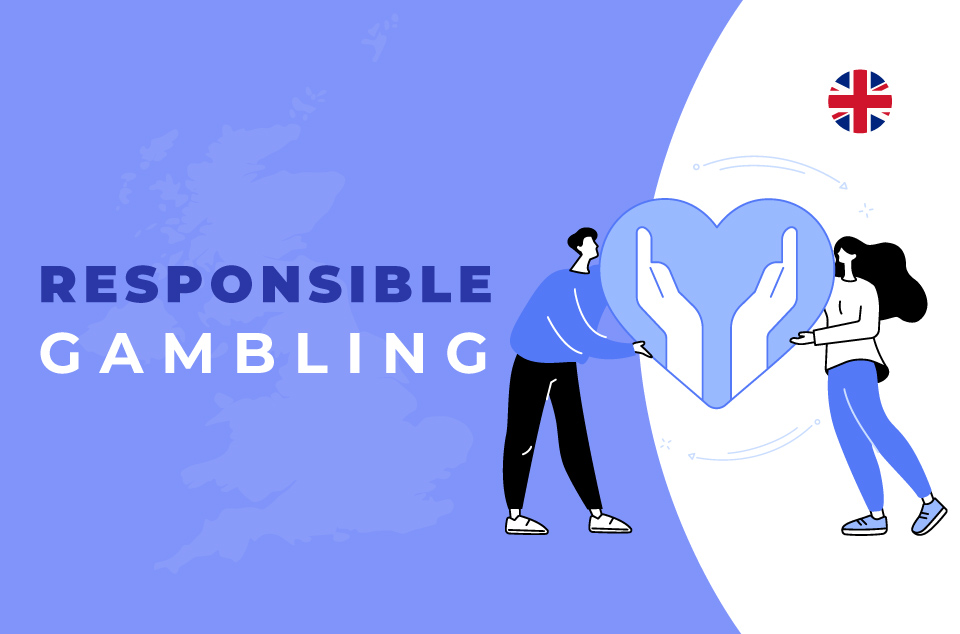The Complete CasinosLists Guide to Responsible Gambling

In the world of British gambling, whether you're a greenhorn or a seasoned player, it's imperative that individuals of all stripes are armed with a comprehensive and accurate understanding of the potential pitfalls associated with this pursuit.
The objective of this page is to serve as a launching pad for further exploration while furnishing valuable insights to ensure your safety when engaging in gambling responsibly.
Understanding Responsible Gambling
Responsible gambling entails the creation of a secure and socially responsible gambling ecosystem where players can revel in this pastime while keeping the potential for harm at bay. This is achieved through the implementation of various tools, regulations, and awareness campaigns.
Responsible gambling is an expansive concept, encompassing a multitude of facets for the various stakeholders involved. However, the overarching goal remains consistent - safeguarding players from the adverse consequences of gambling.
| For | Responsible Gambling means |
|---|---|
| UKGC (United Kingdom Gambling Commission) | The UKGC takes the helm in establishing thoroughly researched and up-to-date regulations that govern casino operators. These regulations ensure that operators provide the necessary resources and conduct their operations ethically and responsibly. |
| Casino Operators | Casino operators, under the purview of the UKGC, must adhere to stringent regulations. They are required to provide British players with access to a gamut of tools and resources to help them manage and control their gambling habits effectively. |
| NGOs (Non-Governmental Organizations) | NGOs play a pivotal role in running educational campaigns and fostering dialogues about responsible gambling among players, casinos, and regulatory bodies. These entities also raise funds for, and operate treatment programs, offering crucial support to individuals grappling with problem gambling. |
| Affiliates (like us) | Affiliates contribute to the cause by disseminating comprehensive information that empowers players to make informed decisions about their gambling activities. They engage in the crucial task of educating readers about potential risks and proffering actionable tips to maintain a sense of control. |
| Players (like you) | Players, the heart of the gambling industry, must keep themselves well-informed about the effects of gambling. They should vigilantly monitor their gameplay, pinpointing any warning signs of problem gambling at the earliest juncture. Employing responsible gambling tools to their advantage and seeking professional help when concerns arise is paramount. |
One misconception that must be dispelled is that responsible gambling solely revolves around aiding problem gamblers. In reality, its primary focus is prevention, aiming to educate and ensure that no one stumbles unknowingly into the abyss of a severe gambling problem.
Understanding the Impact of Gambling on the Human Brain

Why Do People Gamble?
The motivations behind gambling are diverse, extending beyond the simple desire to win monetary prizes:
- The allure of anticipating rewards, especially in high-stakes situations.
- The need for an escape from the rigors of daily life.
- The seductive portrayal of gambling in the media.
- Widespread participation and societal acceptance make trying one's luck more accessible.
In essence, gambling can morph into a harmless and enjoyable pastime when approached judiciously, accompanied by a balanced array of other activities. Players who arm themselves with knowledge about potential pitfalls and utilize available tools are less likely to become ensnared by gambling-related problems.
The Genesis of Gambling Addiction
For a considerable duration, the medical fraternity categorized problem gambling as a compulsion, distinguishing it from the realm of addiction. The conventional belief was that individuals gambled in a disordered manner primarily as a means to alleviate anxiety, akin to certain individuals who found solace in compulsive nail-biting.
The paradigm shifted with the advent of the fifth edition of the Diagnostic and Statistical Manual of Mental Disorders in 2013. This seminal update rebranded Pathological Gambling as Gambling Disorder, effectively recognizing that problem gambling shares similarities with substance abuse disorders.
Consequently, professionals were urged to treat it on par with other forms of addiction.
The crux of addiction lies in what is known as a variable ratio reinforcement schedule. The unpredictable and unexpected rewards inherent in gambling are potent stimuli that swiftly condition our brains to yearn for the next gambling session.
When individuals turn to gambling as a coping mechanism for negative emotions or isolation, the habit can rapidly spiral into full-blown addiction. Such individuals are effectively training themselves to seek the exhilarating "highs" of gambling as a means to counteract emotional lows.
Navigating Responsible Gambling in the UK
To engage in responsible gambling is to possess an acute understanding of the inherent risks and to maintain a vigilant watch over one's emotional state during gambling activities. It is an exercise in deliberate, informed choice.
Here, we present ten fundamental tips for responsible gambling:
- Anticipate and accept losses as part of the gambling experience.
- Refrain from gambling when emotional turmoil reigns.
- Avoid the perilous pursuit of losses.
- Never misconstrue gambling as a means of income or a shortcut to wealth.
- Eschew the use of credit cards or borrowed funds for gambling.
- Steer clear of gambling under the influence of alcohol or substances.
- Set stringent monetary and temporal boundaries, adhering to them unwaveringly.
- Institute regular breaks from gambling, diverting attention to other enjoyable pursuits.
- Cultivate a diverse range of hobbies and interests to maintain a balanced life.
- Acquaint yourself thoroughly with the mechanics of gambling addiction, discern early warning signs, and familiarize yourself with available avenues of assistance should concerns arise.
Tools for Responsible Gambling for UK Players

UKGC-regulated gambling platforms are well-equipped with an arsenal of tools designed to empower players in maintaining control over their gambling activities.
Here, we elucidate some of the most prevalent and efficacious tools available in UK online casinos:
- Deposit Limits: Empower players to set monthly, weekly, or daily limits on deposits, effectively preventing any further deposits once the predetermined threshold is met.
- Wager Limits: Facilitate the setting of limits on bet sizes to stave off the temptation to escalate wagers during losing streaks.
- Time Limits: Encourage players to allocate time limits to their gambling sessions, ensuring that frequent breaks are taken to maintain a healthy balance in life.
- Optional Time-Outs: Allow players to initiate self-imposed bans from gambling platforms for specified durations. These breaks serve as opportunities to reassess one's gambling habits and detect potential issues in the making.
- Periodic Reminders: Employ pop-up messages at intervals during gameplay to offer players a reality check. These reminders relay information such as the time elapsed since the commencement of the gambling session, the total amount wagered, and winnings.
A meta-analysis of 18 studies has shown that these reminders exert a positive influence on gambling behavior.
These tools are the bedrock of responsible gambling, and their utilization is vital for safeguarding players from the snares of excessive gambling.
Recognizing and Addressing Problem Gambling

Identifying a Gambling Addiction
Assessing whether one is entrapped by a gambling addiction necessitates a systematic approach. It involves gathering pertinent information, adopting an objective stance toward one's gambling habits, and availing oneself of monitoring tools such as deposit histories to gain an aerial view of one's gambling activities.
Involving loved ones can also be instrumental, as they can offer an unbiased perspective on one's gambling behaviors. It is imperative to approach this matter with candor and openness, dispelling any stigma or shame surrounding the issue.
Red Flags of Problem Gambling
Certain indicators serve as warning signs of a gambling problem:
- Neglecting financial responsibilities or defaulting on bills.
- Exhibiting marked mood swings contingent upon gambling wins or losses.
- Prioritizing gambling over school, work, social engagements, or other obligations.
- Concealing one's gambling habits due to feelings of shame.
- Engaging in deception, either towards others or oneself, regarding the frequency and intensity of gambling.
- Succumbing to the urge to gamble at inappropriate times or when one's schedule does not permit.
A wealth of informative resources is available to aid in recognizing gambling addiction. Additionally, individuals can undertake a confidential self-assessment quiz on BeGambleAware.com.
Taking the First Steps Toward Recovery in the UK

Acknowledging the presence of a potential gambling addiction represents the initial, and often the most arduous, stride toward recovery. Numerous avenues are available for those embarking on this journey, including:
- Gaining a profound understanding of how gambling impacts the brain and fosters addiction.
- Researching treatment methods that have proven effective for others and appear suitable for one's unique situation.
- Aggregating pertinent details about one's gambling habits, centralizing them for easy reference. This may encompass data such as deposit history, gambling frequency, and the specific triggers that instigate gambling tendencies.
GamCare offers an invaluable recovery toolkit replete with assessment tools, self-guided workbooks, and a repository of resources encompassing blocking software, debt management, and peer support. Regardless of the chosen path, be it professional treatment or self-guided recovery, comprehensive self-reflection and understanding represent the cornerstone of progress.
Most Effective Treatments Available in the UK

For those electing to pursue professional support in the UK, a spectrum of effective treatments awaits:
Cognitive Behavioral Therapy (CBT)
This form of talk therapy, administered by CBT-trained professionals, assists individuals in reshaping their thought processes and acquiring new coping mechanisms.
Research indicates that CBT can yield tangible benefits, including:
- Reduction in the number of gambling days
- Prolonged abstinence
- Enhanced management of cravings and triggers
- Restructuring of maladaptive gambling thoughts.
12-Step Programs
Modeled after the successful framework used for addressing alcohol addictions, Gamblers Anonymous UK offers a 12-step system. This program provides peer support and rewards incremental victories. It organizes regular meetings attended by both gamblers and their family members while supplying ample resources to bolster their journey.
Benefits encompass:
- Reevaluation of gambling-related issues
- The restoration of trust with loved ones
- Imposition of accountability measures to mitigate the risk of relapse.
Medication
On certain occasions, mental health conditions or neurochemical imbalances can impede the efficacy of talk therapy. Recent trials have illuminated the potential of medication in the treatment of gambling addiction.
Naltrexone, in particular, has demonstrated promise in this regard. This medication functions by "blocking" the brain receptors responsible for the euphoric sensations experienced during gambling.
Notably, naltrexone should only be prescribed by a psychiatrist initially. Subsequent prescription management may be undertaken by one's general practitioner (GP).
It is pivotal to recognize that effective treatment is within reach, offering hope to those grappling with gambling addiction.
Assisting a Loved One with a Gambling Addiction
Supporting a loved one who is grappling with problem gambling entails a multifaceted approach:
- Refrain from casting blame upon the gambler. It is essential to dispel the misconception that addiction stems from personal weakness or moral failings. Creating a safe and judgment-free space for the individual to discuss their experiences is paramount.
- Gently but firmly encourage the gambler to seek professional assistance. The complexity of mental health issues necessitates intervention from trained professionals, as attempting to resolve the matter independently may exacerbate the situation.
- Exercise discretion when it comes to financial matters. It is imperative to withhold financial support for gambling activities. In cases where joint accounts exist, imposing limitations on access to funds is advisable. Redirecting the individual to reputable channels for addressing debt, such as StepChange, or advising them to seek professional financial counseling, can be of great assistance.
- Acknowledge the potential impact on your own well-being. Spouses and loved ones often grapple with post-traumatic stress disorder or develop coping mechanisms of their own, such as smoking or alcohol consumption. Prioritizing self-care and seeking therapy can fortify one's ability to provide steadfast support to the individual on their path to recovery.
Ushering the Next Generation Away from Underage Gambling in the UK
Teenagers possess a heightened susceptibility to gambling addiction, underscoring the need for parents to take proactive measures to shield their children. It is a sobering fact that teenagers are two to four times more likely to develop gambling addictions, as per the USA recovery clinic Algamus.
Additionally, research highlighted in a document by the National Council for Problem Gambling underscores the devastating effects of parental problem gambling on children.
To insulate your children from the perils of gambling, consider implementing the following measures:
- Respond to their queries regarding gambling with calm and comprehensive explanations, imparting a nuanced understanding of the associated dangers.
- Maintain a vigilant watch over your children's gaming activities, engaging in open conversations about games that mimic gambling, such as loot boxes and gacha games.
- If your child has already ventured into gambling, approach the situation with understanding and compassion. Seek professional help promptly while avoiding actions that may evoke guilt or shame.
Parenting Tip
Big Deal, an NGO dedicated to preventing underage gambling, offers educational programs replete with engaging videos and interactive tools for children and teenagers.
These resources are designed to aid in comprehending the hazards associated with gambling and recognizing signs of problem gambling among peers.
A Guide to Self-Exclusion for British Players

What is Self-Exclusion?
In the realm of UKGC-regulated casinos, self-exclusion represents a powerful tool that enables players to block access to their accounts for predetermined durations voluntarily.
British players are afforded two main options for self-exclusion: nationwide and operator-wide schemes.
While self-exclusion serves as an effective starting point for addressing gambling problems, it is primarily employed by individuals who acknowledge the presence of an issue and are actively seeking help.
Nonetheless, a recent meta-analysis examining the efficacy of self-exclusion programs in various countries revealed a common hindrance - many players breach their self-exclusion agreements before the specified timeframe elapses.
Furthermore, limited awareness about these programs, a lack of comprehension regarding gambling addiction, or sheer denial can deter players from accessing these invaluable resources in the first place.
UKGC Self-Exclusion Regulations
Upon formalizing a self-exclusion agreement, businesses are obligated to:
- Close the player's accounts.
- Return any funds held within those accounts.
- Erase the player's personal details from their databases.
- Prevent the creation of new accounts for the duration of the self-exclusion period.
Players themselves bear a crucial responsibility as well: refraining from engaging in gambling during the self-exclusion period. Any attempt to gamble during this time is not only ill-advised but also contravenes the terms of the agreement.
Important
Should a casino permit gambling during the self-exclusion period, serious consequences may ensue. It is imperative to report such instances directly to the UKGC, reinforcing the need for a robust self-exclusion mechanism.
Additionally, businesses are mandated to institute their own self-exclusion schemes, providing players with the option to exclude themselves from a specific casino if the need arises.
How to Self-Exclude in the UK: A Step-by-Step Guide
The process for self-exclusion hinges on individual circumstances. For players under the purview of the UKGC, self-exclusion can be initiated within your casino account or by contacting customer service.
However, if your aim is to exclude yourself from multiple or all UK casinos, several nationwide schemes cater to British players:
- MOSES: A multi-operator scheme that encompasses various UK betting shops.
- GAMSTOP: An all-encompassing solution enabling exclusion from all UK-licensed gambling websites and apps.
- SENSE: A self-exclusion scheme applicable to all land-based casinos in Great Britain.
- BISES: An exclusion scheme tailored for all land-based, licensed bingo premises in Great Britain.
- BACTA: Facilitating self-exclusion from Adult Gaming Centres.
To register for one of these schemes, you can typically complete an online form or make contact with the relevant organization via phone or email.
The shortest self-exclusion term in the UK extends to six months, while players have the option to self-exclude for a maximum of five years. Notably, self-exclusion terms renew automatically unless players explicitly request otherwise by contacting the organization.
Paramount to grasp
Once initiated, self-exclusion cannot be reversed. Indeed, in most cases, there should be no desire to rescind the agreement, as it represents a vital step on the path to recovery.
In Conclusion
Responsible gambling in the UK is a collective moral imperative for all stakeholders involved in the industry. Access to comprehensive information and heightened awareness of potential risks are non-negotiable prerequisites.
Openness and candor in discussions about gambling are of paramount importance - both with oneself and with loved ones. Seeking assistance when necessary is not a sign of weakness; rather, it is a testament to one's commitment to well-being.
Gambling addiction can affect individuals from all walks of life, irrespective of their social status, educational background, financial situation, or personal character.
Remember, your journey towards responsible gambling is not one you embark on alone; support is readily available to ensure that you navigate the world of gambling with wisdom, awareness, and safety.
